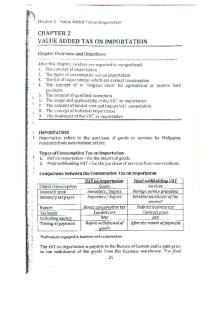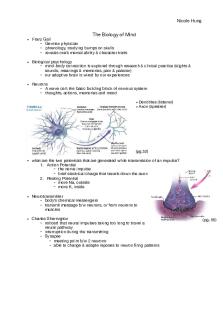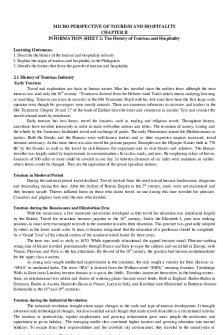Chapter 2 OB - Lecture notes 2 PDF

| Title | Chapter 2 OB - Lecture notes 2 |
|---|---|
| Course | Organizational Behaviour |
| Institution | British Columbia Institute of Technology |
| Pages | 6 |
| File Size | 352.5 KB |
| File Type | |
| Total Downloads | 2 |
| Total Views | 157 |
Summary
Chapter 2...
Description
Chapter 2 MARS Model of Individual Behaviour
Employee Motivation Internal forces that affect a person’s voluntary choice of behaviour • direction • intensity • persistence
Employee Ability Aptitudes and learned capabilities required to successfully complete a task Person–job matching • selecting • developing • redesigning
Role Perceptions Understand the job duties expected of us. Role perceptions are clearer when we: • understand our tasks or accountable consequences • understand task/performance priorities • understand the preferred behaviours/procedures Benefits of clear role perceptions: • Higher proficient job performance • Better coordination with others • Higher motivation
Situational Factors Conditions beyond person’s short-term control that constrain or facilitate behaviour • Constraints – time, budget, facilities, etc • Cues – e.g. signs warning of nearby hazards
Personality in Organizations Relatively enduring pattern of thoughts, emotions, and behaviours that characterize a person, along with the psychological processes behind those characteristics Personality traits • Clusters of internally-caused behaviour tendencies • Situation suppresses behaviour tendencies, but still evident
Types of Individual Behaviour
Task performance • Voluntary goal-directed behaviours, support firm’s objectives • Three types of performance - Proficient - Adaptive - Proactive Organizational citizenship • Cooperation/helpfulness to others, supporting work context • Directed toward individuals and organization • Not necessarily discretionary (i.e. may be job requirement) Counterproductive work behaviours • Voluntary behaviours that may harm the organization Joining and staying with the organization Maintaining work attendance • Absences due mainly to situation and motivation • Presenteeism – attending scheduled work during significantly reduced capacity (illness etc.)
Nature vs. Nurture of Personality Influenced by nature • Heredity explains about 50 percent of behavioural tendencies Influenced by nurture • Socialization, learning Personality stabilizes in young adulthood • Self-concept gets clearer, more stable with age • Executive function regulates behaviour • But some traits change throughout life
Five-Factor Personality Model (CANOE)
Five-Factor Personality and Individual Behaviour
Jungian Personality Theory Swiss psychiatrist Carl Jung Preferences for perceiving the environment and obtaining/processing information Myers-Briggs Type Indicator (MBTI) • Measures Jungian types • Most widely used personality test in business • Good for self and other awareness • Higher scores are neither better or worse than lower scores • Poor predictor of performance, leadership, team development
Jungian & Myers-Briggs Types
Values in the Workplace Stable, evaluative beliefs that guide our preferences • Define right/wrong, good/bad – what we “ought” to do • Direct our motivation, potentially decisions/behaviour Value system -- hierarchy of values Compared with personality, values are: • Evaluative (not descriptive) • May conflict strongly with each other • Affected more by nurture than nature
Schwartz’s Values Model 57 values clustered into 10 categories, further clustered into four quadrants • Openness to change - motivated to pursue innovative ways • Conserv ation - motivated to preserve the status quo • Self-enhancement - motivated by self-interest • Self-transcendence - motivated to promote welfare of others and nature
Personal Values and Behaviour How personal values influence decisions/behaviour: 1. Affect the relative attractiveness of choices 2. Frame perceptions 3. Act consistently with self-concept and public image Why personal values have limited influence: • Situation -- interferes with values-consistent behaviour • Counter-motivational forces – influences us to act contrary to our values • Awareness (salience) -- relevance of values isn’t obvious - Values are abstract Routine behaviour isn’t evaluated for values consistency
Values Congruence Similarity of a person’s values hierarchy to another source Importance of values congruence • Team values congruence — higher team cohesion and performance • Person-organization values congruence -- higher job satisfaction, loyalty, and organizational citizenship, lower stress and turnover
Ethical Values and Behaviour Ethics: study of moral principles/values –whether actions are right/wrong, outcomes are good/bad Three ethical principles • Utilitarianism – greatest good for the greatest number • Individual rights – everyone has same natural rights • Distributive justice – benefits/burdens should be proportional
Influences on Ethical Conduct Moral intensity • Degree an issue demands application of ethical principles Moral sensitivity • Person’s ability to detect presence/importance of moral issue • Higher moral sensitivity due to: - expertise - previous dilemma experience - empathy - ethical self-concept - mindfulness
Situational influences • External forces to act contrary to moral principles and values
Individualism The degree to which people value personal freedom, self-sufficiency, control over themselves, being appreciated for unique qualities
Collectivism The degree to which people value their group membership and harmonious relationships within the group
Power Distance High power distance • Value obedience to authority • Comfortable receiving commands from superiors • Prefer formal rules and authority to resolve conflicts Low power distance • Expect relatively equal power sharing • View relationship with boss as interdependence, not dependence
Uncertainty Avoidance High uncertainty avoidance • Feel threatened by ambiguity and uncertainty • Value structured situations and direct communication Low uncertainty avoidance • Tolerate ambiguity and uncertainty
Achievement-Nurturing High achievement orientation • Assertiveness • Competitiveness • Materialism High nurturing orientation • Value relationships Focus on human interaction
Cultural Diversity within Canada Deep-level diversity across ethnic and regional groups • Francophones tend to be more liberal and permissive than Anglophones – reverse of a few decades ago Personal values/traits vary across Canadian regions • e.g., egalitarianism higher in Atlantic Canada and Quebec • e.g., openness to experience and emotional stability highest in British Columbia, lowest in Quebec Regional variations seem to be caused by: • regional institutions (local government, education, religions) • regional migration physical environment(smallest effect)
Appendix 1 MARS Model of Individual Behaviour Personality, values, self-concept, perceptions, emotions and attitudes, and stress all affect an individual’s motivation, ability and role perceptions. These, in addition to situational factors, affect individual behaviour and results.
Appendix 2: Five-Factor Personality and Individual Behaviour Personality predictors of proficient task performance • Conscientiousness is best personality predictor of proficient task performance - especially specific traits of industriousness (achievement, self-discipline, purposefulness) and dutifulness - set higher personal goals, more persistent • Extraversion second best personality predictor of proficient task performance - especially specific traits of assertiveness and positive emotionality - assertive employees frame situations as challenges rather than threats Personality predictors of adaptive task performance • Emotional stability (low neuroticism): cope with ambiguity and uncertainty of change • Extraversion (especially assertiveness): comfortable influencing others, engaging with environment • Openness to experience: have more curiosity, imagination, and tolerance of change Personality predictors of proactive task performance • Extraversion (especially assertiveness): comfortable influencing others, engaging with environment • Openness to experience: have more curiosity, imagination, and tolerance of change Personality predictors of organizational citizenship • Conscientiousness: more dutiful, dependable • Agreeableness: motivated to be cooperative, sensitive, flexible, and supportive Personality predictors of counterproductive work behaviours • Conscientiousness (negative correlation): people with low conscientiousness are less dependable and feel less obligation toward others • Agreeableness (negative correlation): people with low agreeableness are less caring of others, less need to be liked
Appendix 3 Jungian & Myers-Briggs Types Extraversion (E) - talkative, externally-focused Introversion (I) – quiet, internally-focused These involve getting energy. Sensing (S) - concrete, realistic, practical Intuitive (N) – imaginative, future-focused, abstract These involve perceiving information. Thinking (T) - logical, objective, impersonal Feeling (F) – empathetic, caring, emotion-focused These involve making decisions Judging (J) -organized, schedule-oriented Perceiving (P) – spontaneous, adaptable, opportunity-focused These involve orienting to the external world...
Similar Free PDFs

Chapter 2 OB - Lecture notes 2
- 6 Pages

OB EXAM 2 Notes
- 53 Pages

Chapter 2 - Lecture notes 2
- 30 Pages

Chapter 2 - Lecture notes 2
- 4 Pages

Chapter 2 - Lecture notes 2
- 11 Pages

Chapter 2 - Lecture notes 2
- 4 Pages

Chapter 2 - Lecture notes 2
- 3 Pages

Chapter 2 - Lecture notes 2
- 6 Pages

Chapter 2 Lecture Notes
- 8 Pages

Chapter 2 Lecture Notes
- 24 Pages

Chapter 2 Lecture Notes
- 29 Pages

Lecture notes, lecture Chapter 2
- 11 Pages

Ob ch 2 pt 3 - ob chapter 2
- 6 Pages

OB Notes 2 - Organizational behavior
- 50 Pages
Popular Institutions
- Tinajero National High School - Annex
- Politeknik Caltex Riau
- Yokohama City University
- SGT University
- University of Al-Qadisiyah
- Divine Word College of Vigan
- Techniek College Rotterdam
- Universidade de Santiago
- Universiti Teknologi MARA Cawangan Johor Kampus Pasir Gudang
- Poltekkes Kemenkes Yogyakarta
- Baguio City National High School
- Colegio san marcos
- preparatoria uno
- Centro de Bachillerato Tecnológico Industrial y de Servicios No. 107
- Dalian Maritime University
- Quang Trung Secondary School
- Colegio Tecnológico en Informática
- Corporación Regional de Educación Superior
- Grupo CEDVA
- Dar Al Uloom University
- Centro de Estudios Preuniversitarios de la Universidad Nacional de Ingeniería
- 上智大学
- Aakash International School, Nuna Majara
- San Felipe Neri Catholic School
- Kang Chiao International School - New Taipei City
- Misamis Occidental National High School
- Institución Educativa Escuela Normal Juan Ladrilleros
- Kolehiyo ng Pantukan
- Batanes State College
- Instituto Continental
- Sekolah Menengah Kejuruan Kesehatan Kaltara (Tarakan)
- Colegio de La Inmaculada Concepcion - Cebu

